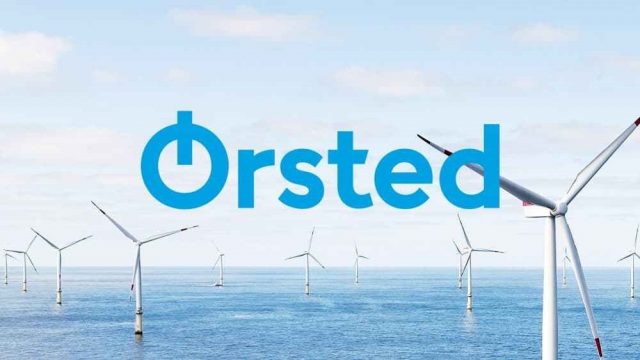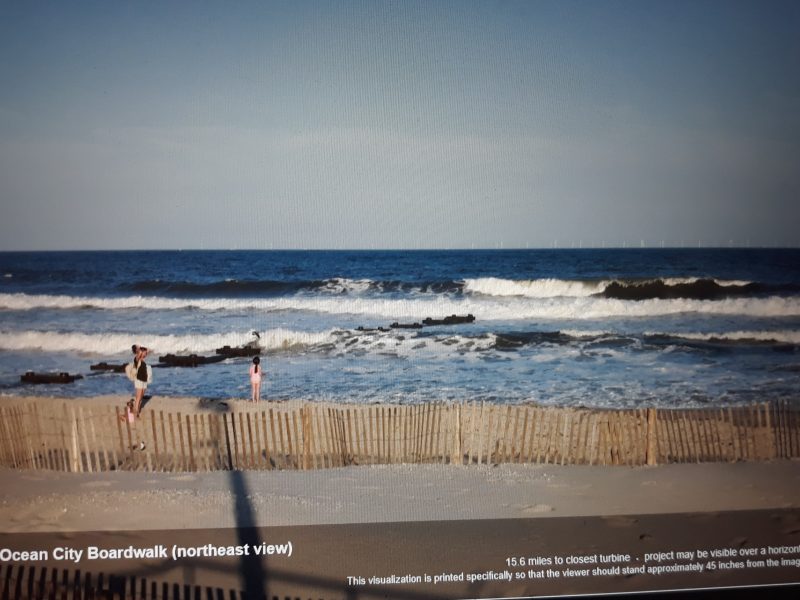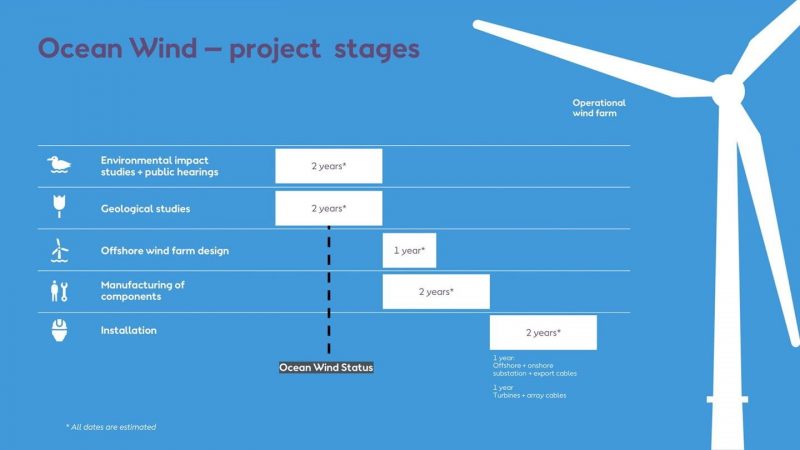
By MADDY VITALE
Offshore wind developer Orsted laid out a plan during a virtual meeting on Tuesday to build a wind farm 15 miles off Atlantic City to the southern tip of the New Jersey coast, a project that would power half a million New Jersey homes and create thousands of jobs.
The Zoom meeting, hosted by Kris Ohleth, senior stakeholder relations manager for Orsted, was the first of three set up amid COVID-19 to relay important details of the project to the general public.
Prior to the pandemic, Orsted hosted meetings throughout the coastal communities, including two in Ocean City, to discuss construction of the wind farm and its potential impact, as well as advantages to communities, including job creation and bolstering the state’s renewable energy.
Orsted officials say the project remains on schedule, with a completion date set for 2024.
During the question and answer portion, attendees asked if the wind farm would be visible from the shoreline and if the blades of the turbines were audible from land. Others asked the cost of the project, if there were incentives available for coastal communities impacted by the wind farm and how many jobs would result.
The next free session is Wednesday at 6 p.m. and this Saturday at 10 a.m. The public is invited to join by registering in advance at www.OceanWind.com.
“This is an 1,100-megawatt offshore wind farm. The project is 15 miles south of Atlantic City and will create significant construction jobs,” Ohleth said at the beginning of her presentation. “We are excited to use the most powerful and efficient turbines in the world. Economic and community development are a hallmark of Ocean Wind.”
After Ohleth’s presentation, attendees got the chance to enter different “stations” during the Zoom meeting. In the stations, they were able to hear from Orsted’s experts and ask questions about the visuals, design, economic development, environmental and permitting aspects of the project, how it affects fishing, shipping and navigation, as well as where the cables might be routed from the land into the ocean.
“You will learn a little more about how exciting the job opportunities there are with offshore wind and how it can support thousands of jobs,” Ohleth said.
Specifically, Ocean Wind would create 69 full-time jobs in operations and maintenance of its facility in Atlantic City to service the turbines during the lifetime of the wind farm. However, the big payoff would be the thousands of construction jobs created by the project.

The project consists of 90 turbines in the Atlantic off the New Jersey coast, producing 1,100 megawatts of power. The turbines would be spaced about a mile apart in rows and built in deep water. The hub of the turbine would stand 511 feet tall, with blades increasing the height to a total of 905 feet, officials have said.
The turbines would only be faintly visible on the clearest of days from the shoreline, Ohleth emphasized during Tuesday’s session.
In one of the stations in the virtual meeting, landscape architect Terry DeWan explained through a succession of 10 simulations what one would likely see from different vantage points in coastal communities.
“We wanted to show you what the project looked like in various sea levels,” he explained.
One person asked if there was a possibility that the blades on the turbines could be heard.
DeWan said no, certainly not from 15 miles away or farther, depending on the coastal community.
Experts in the economic development station highlighted some ways funds would be available through a grant or trust to help small businesses in coastal communities. In addition, funding would be available for coastal infrastructure and resiliency projects.
Attendee Harley Cummings asked, “You mentioned economics in general terms. What are the specific benefits to the communities impacted by the construction?”
Ohleth responded, “We have exciting opportunities through a $15 million trust. All coastal communities are able to apply. We are constantly in contact with the mayors of those local communities. One of the intentions of the granting program was to make the funding available for coastal communities.”
Attendee Robert Foreman asked what the cost was to manufacture and maintain the wind farm.
“That is an interesting question. I do know that at Orsted, we are constantly striving to keep down the costs,” Ohleth said, noting that the attendees should visit the specific stations in the Zoom meeting to ask the question to the expert in the particular field.
According to media reports, the estimated cost of the project is $1.6 billion.
One participant asked how Orsted would mitigate the noise of construction.
Ohleth responded, “Right now, we are still in the permitting phase. We submitted our construction and operation plan and the potential impacts of the project. It won’t disturb marine mammals.”








